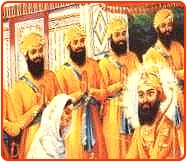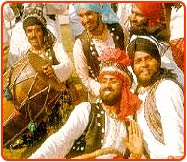Baisakhi Festival
Date of Baisakhi
Baisakhi Festival falls on the first day of Vaisakh month (April-May) according to Nanakshahi or Sikh Calendar. For this reason, Baisakhi is also popularly known as Vaisakhi. According to English calendar, the date of Baisakhi corresponds to April 13 every year and April 14 once in every 36 years. This difference in Baisakhi dates is due to the fact that day of Baisakhi is reckoned according to solar calendar and not the lunar calendar. The auspicious date of Baisakhi is celebrated all over India under different names and different set of rituals and celebrations. Baisakhi date coincides with 'Rongali Bihu' in Assam, 'Naba Barsha' in Bengal, Puthandu in Tamil Nadu and 'Pooram Vishu' in Kerala.
Baisakhi Celebrations
People of Punjab celebrate the festival of Baisakhi with exuberance and devotion. As the festival has tremendous importance in Sikh religion, major activities of the day are organized in Gurdwaras. People wake up early to prepare for the day. Many also take bath in the holy river to mark the auspicious occasion. After getting ready people pay a visit to their neighbourdood gurdwara and take part in the special prayer meeting organized for the day. At the end of the Baisakhi ardas, congregates receive specially prepared Kara prasad or sweetened semolina. This is followed by a guru ka langar or community lunch.

Later, during the day people of Sikh faith take out a Baisakhi procession under the leadership of Panj piaras. The procession moves through the major localities of the city amidst the rendition of devotional songs by the participating men, women and children. Mock duels, bhangra and gidda performances make the procession joyous and colourful.
Celebrations by Farmers
For the large farming community of Punjab and Haryana, Baisakhi marks a New Year’s time as it is time to harvest rabi crop. On Baisakhi, farmers thank god for the bountiful crop and pray for good times ahead. People buy new clothes and make merry by singing, dancing and enjoying the best of festive food.
Cries of "Jatta aai Baisakhi", rent the skies as gaily men and women break into the bhangra and gidda dance to express their joy. Everyday farming scenes of sowing, harvesting, winnowing and gathering of crops are expressed through zestful movements of the body to the accompaniment of ballads and dhol music.
In several villages of Punjab Baisakhi Fairs are organized where besides other recreational activities, wrestling bouts are also held.
Baisakhi Celebrations
 |
For the predominant Sikh population of Punjab Baisakhi is one the biggest festival as it marks the foundation day of Khalsa Panth by the tenth Sikh Guru, guru gobind singh . Sikh community located anywhere in the world celebrate Baisakhi by participating in the special prayer meets and Baisakhi processions.
Baisakhi Celebrations by Farmers
In the villages of Punjab and Haryana, the day of Baisakhi is full of colors and vibrancy. Cries of “Jatta aayi Baisakhi” reverberate in the skies as gaily-dressed men and women move towards the fields to celebrate the occasion. High point of Baisakhi celebrations in villages is the performance of traditional folk dance bhangra and gidda by men and women respectively. The dance is simple in movement but is extremely energetic and is performed in-groups on the beat of dhol.
Farmers also celebrate Baisakhi as a Thanksgiving Day. After taking an early bath in ponds or rivers people visit temples or gurdwaras to express gratitude to the Almighty for the bountiful harvest and pray for prosperity and good times in future.
At several places in Punjab colourful Baisakhi Fairs are also organized to celebrate the day. People participate in these fairs with lots of enthusiasm and charm. Major attractions of Baisakhi Fairs are the bhangra and gidda performances besides wrestling bouts, singing and acrobatics. Performance of folk instruments - vanjli and algoza is also quite popular. Food stalls and shops selling trinkets make baisakhi melas even more joyful.
Baisakhi Celebrations by Sikhs
Sikhs celebrate this very important day of their religion with joy and devotion. They take an early bath, wear new clothes and visit the neighborhood gurdwara (Sikh place of worship) to participate in the special prayer meet marked for the day. After a special ardas of kirtans (religious songs) and discourses kada prasad (sweetened semolina) is distributed amongst all present. Later, people sit in rows to relish the langer or community lunch prepared and served by kar sevaks or volunteers.
Major celebrations of Baisakhi are organized at Golden Temple, Amritsar where the Khalsa Panth was founded on a baisakhi day in 1699. Most Sikhs strive to visit Golden Temple on the occasion.
Another high point of Baisakhi celebrations by Sikhs is the Baisakhi proccssion or nagar kirtan carried though the city under the leadership of Panj Piaras or the Five Beloved Ones. Men, women and children alike participate in the Baiskhi processions with enthusiasm. Mock duels, bands playing religious tunes and performance of bhangra and gidda dance make Baisakhi processions quite colourful and enchanting.
Later in the evening, people exchange greetings with friends and relatives usually with a box of sweets or other traditional gifts.
Baisakhi Celebration in India
The auspicious day of Baisakhi is celebrated all over India though under different names and with different set of rituals. People of Assam celebrate April 13 as Rongali Bihu , while those in West Bengal celebrate it as naba Barsha . Bihar celebrates Baisakhi as Vaishakh in honour of the Sun God, Surya while Kerala celebrates it as Vishu and Tamil Nadu as puthandu . In Kashmir, a ceremonial bath and general festivity mark Baisakhi while in Himachal Pradesh devotees flock to the temple of Jwalamukhi and take a holy dip in the Hot Springs.
No comments:
Post a Comment